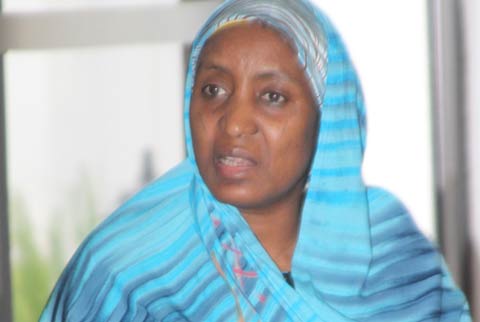Hajia Turai Yar’Adua was one First Lady that was seen but hardly heard. Yet, she was perceived to be very influential in government and over her husband, the late President Umaru Musa Yar’ Adua.
Part of the speculations about her was that certain decisions believed to be taken by President Yar’Adua were indeed taken by her..

Former First Lady, Hajiya Turai Yar'adua receiving sympathizers who thronged the residence of deceased, Late President Umaru Yar'adua as the body was taken for interment from the State House, Abuja. Photo by Abayomi Adeshida
It is believed in several quarters that because of President Yar’ Adua’s failing health, his wife Turai held sway on his behalf on many issues. For instance, during the last cabinet reshuffle, it was reported that ministers who were desperate to retain their portfolios lobbied the First Lady.
She was said to be very influential in the appointment of the former Director-General of the National Action Committee on AIDS, NACA, Prof. Babatunde Osotimehin, as the Minister of Health.
Before this time, Oshotimehim was said to be contending for the post of Director-General of National Agency for Food and Drugs Administration and Control, NAFCDAC.
Turai Yar’Adua, whose pet project was cancer eradication, was said to be interested in Osotimehin’s appointment to the health ministry because of the way he handled NACA anti-HIV/AIDS campaigns held in the six geo-political zones of the country.
The late President’s denial that his wife influenced him did not however change the common opinion about her. In the Villa , the First Lady was perceived to be fully in charge of many of the decisions taken. She was perceived to be the late President’s closest adviser and during the period of his absence, she was said to be in charge of affairs in the Villa.
State governors also allegedly courted her friendship in their bid to remain close to the President.
Sources alleged that these governors used their wives to court Turai’s friendship by advising them to initiate some projects that would demand inviting the First Lady to their states.
Apart from Yar’Adua denying the allegation of his wife’s influence, her spokesman, Mr. Lawan Bakori, also dismissed them as mere rumours which were never substantiated.
Hajia Dada Habib: In a roller coaster of emotions
EVEN as the body of the late President Umaru Yar’Adua was being committed to mother earth yesterday afternoon in his home town, Katsina, there was no word to portray grieving Hajia Dada Habib, matriarch of the Yar’Adua family and mother of the deceased.
Unlike a wife who becomes a widow on the death of her husband, or a husband who becomes a widower when his wife dies or children who become orphans on the death of their parents, there is no apt phrase or word to describe a bereaved mother’s status. No one has coined such an expression that is suitable for a parent who loses a child.
This is just an indication of how dreadfully heartbreaking the loss of a child is and gives insight into the travails of a woman who has witnessed the loss of three children in series.
Like every other parent, Hajia Habib knows children are not supposed to die while their parents are alive. She knows parents are not supposed to bury their children. She knows children should outgrow and outlive their parents and fore bears.
She knows it is the norm for parents to die and leave their children behind. But what gives when the reverse happens?
To Hajia Habib, the loss of one child could be the loss of innocence, while the loss of two children could signify shattered dreams. But what can one say about the loss of three children, especially when one dies at the prime of life as the nation’s No1 citizen? Certainly, it can be nothing other than a pointer to the hopelessness, helplessness and vanity of life.
It just goes to say that whoever is seeking to comfort this grieving mother, needs to recognise and understand the complexities of her emotions and avoid relying on preconceived ideas about the way a parent is supposed to grieve in the event of the death of a child. Her reaction may seem overly intense, self-absorbing, contradictory, or even puzzling.
As a bereaved parent, the death of a child is such an overwhelming event that the response may often be baffling not only to others but to the parent as well. Such is the nature of grief that feelings, thoughts, and emotions need to be processed and that those in grief must look into their hearts and souls and try to heal from within.
Even in her grief, Hajia Habib is a survivor. As she travels the lonely and painful road, she has learned to live with her grief and express her sadness uniquely. Probably she may feel lonely, disconnected and alienated at this time, but all this cannot be out of place since there are no set rules or protocols governing grieving. This is one bereaved mother in a roller coaster of emotions.
Hers is a personal history of a past with the children in question and a present and future without them. Who can make her not to verbalize her pain, not to talk about what happened, not to ask questions, and puzzle aloud, sometimes over and over – why?
Comments